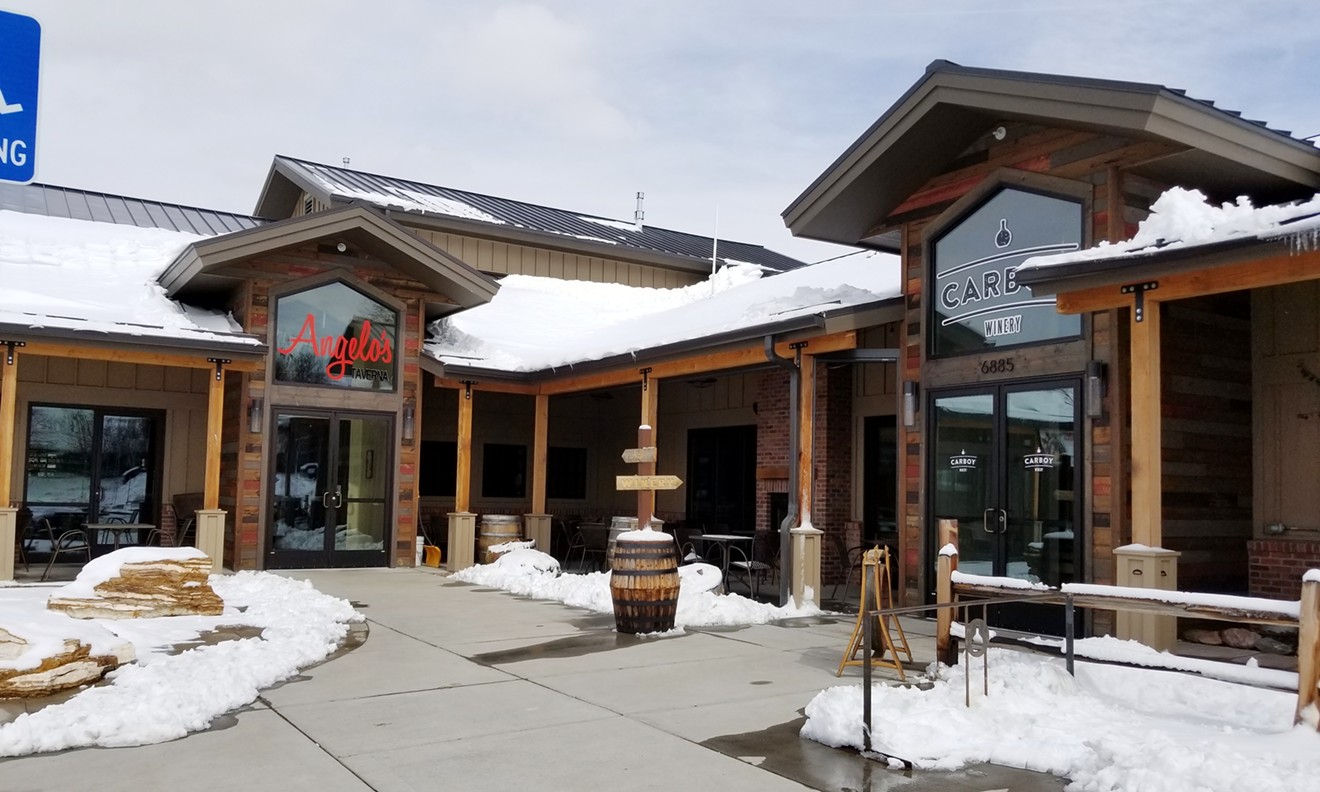Carboy Winery is thinking big. This summer, Carboy's original winery and tasting room at 6885 South Santa Fe Drive will expand its wine production facility by 5,500 square feet and open a new location in the old Govnr’s Park Tavern building at 672 Logan Street in Denver.
The new Governor's Park winery and restaurant will be Carboy’s third location; last year, owners Craig Jones and Eric Hyatt opened their second Carboy inside the venerable Gold Pan Saloon at 103 North Main Street in Breckenridge. Hyatt and Jones first made news back in 2013 for purchasing the forty-year-old Angelo's Taverna — and for adding sublime grilled oysters to the old-school Italian menu. In 2016, they built the first Carboy Winery and a second Angelo’s Taverna in Littleton; the two spaces are adjoining but have slightly different hours and menus.
As for the wine, the taste explains the expansion. The heavenly 2017 viognier made with Grand Valley grapes has crispness reminiscent of a freshly picked autumn apple followed by a succulent finish. A portion of the 2018 vintage is barrel-fermented and will be blended with another lot fermented in a stainless steel tank to accentuate the roundness that makes the 2017 such a pleasure to drink. I also sampled a fragrant sémillon from the barrel that will be combined with the viognier and an albariño to produce a Colorado-sourced grape blend named BlanCo. The 2018 viognier, a deep red malbec and an earthy cabernet franc will all be exceptional with a little more time in wood.
The Littleton production-room expansion is the result of the growing demand for these wines. The winery processed 17 tons of Colorado grapes in 2017 and 68 tons in 2018. This year, winemaker Tyzok Wharton and team expect to process 100 tons. Roughly 60 percent of Carboy’s wines are made with Colorado grapes, and the remainder is produced from California grapes that come to the winery fermented and ready for barrel-aging and/or blending. The Breckenridge and Denver winery sites will produce some wine, but the Littleton winery will be the primary production facility.
“We’re ramping up to meet market demand for Colorado wine," Wharton explains. "Colorado is an up-and-coming wine-growing region. We’re part of growing collective of local producers pioneering Grand Valley as a quality American Viticulture Area.”
With more than a decade in wine-making in California’s Bay Area and a stint in Mendoza, Argentina, the vintner is enthusiastic about the potential of the Colorado wine industry. He has been cultivating relationships with growers in Grand Valley and enjoys working with lesser-known grape varieties like roussanne and albariño, as well as applying a bit of creativity to more common varieties like riesling. A recent “orange wine” experiment, so named by the orange tint gained by extended contact with the grape skins, produced a riesling redolent of fresh orange peel. Named Peau et Chair, the wine is mellowing in the bottle and will soon be ready.
Carboy Winery is open Monday through Thursday from 1 to 10 p.m., Friday from 1 to 11 p.m., Saturday from noon to 11 p.m., and Sunday from noon to 10 p.m. Call the winery at 720-531-5252 or visit the Carboy website for more information.
[
{
"name": "Air - MediumRectangle - Inline Content - Mobile Display Size",
"component": "12017618",
"insertPoint": "2",
"requiredCountToDisplay": "2"
},{
"name": "Editor Picks",
"component": "17242653",
"insertPoint": "4",
"requiredCountToDisplay": "1"
},{
"name": "Inline Links",
"component": "18838239",
"insertPoint": "8th",
"startingPoint": 8,
"requiredCountToDisplay": "7",
"maxInsertions": 25
},{
"name": "Air - MediumRectangle - Combo - Inline Content",
"component": "17261320",
"insertPoint": "8th",
"startingPoint": 8,
"requiredCountToDisplay": "7",
"maxInsertions": 25
},{
"name": "Inline Links",
"component": "18838239",
"insertPoint": "8th",
"startingPoint": 12,
"requiredCountToDisplay": "11",
"maxInsertions": 25
},{
"name": "Air - Leaderboard Tower - Combo - Inline Content",
"component": "17261321",
"insertPoint": "8th",
"startingPoint": 12,
"requiredCountToDisplay": "11",
"maxInsertions": 25
}
]














